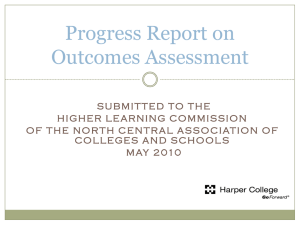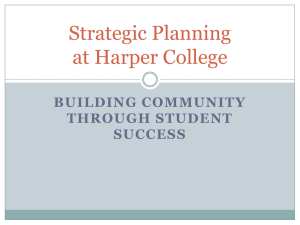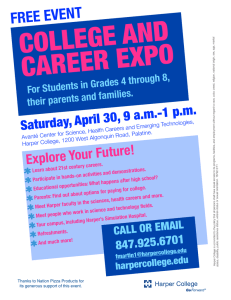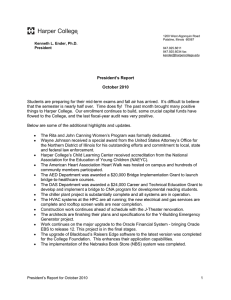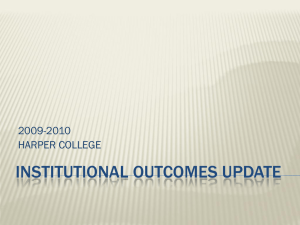inside From the President’s Desk: No Tuition Hike for 2009-2010
advertisement
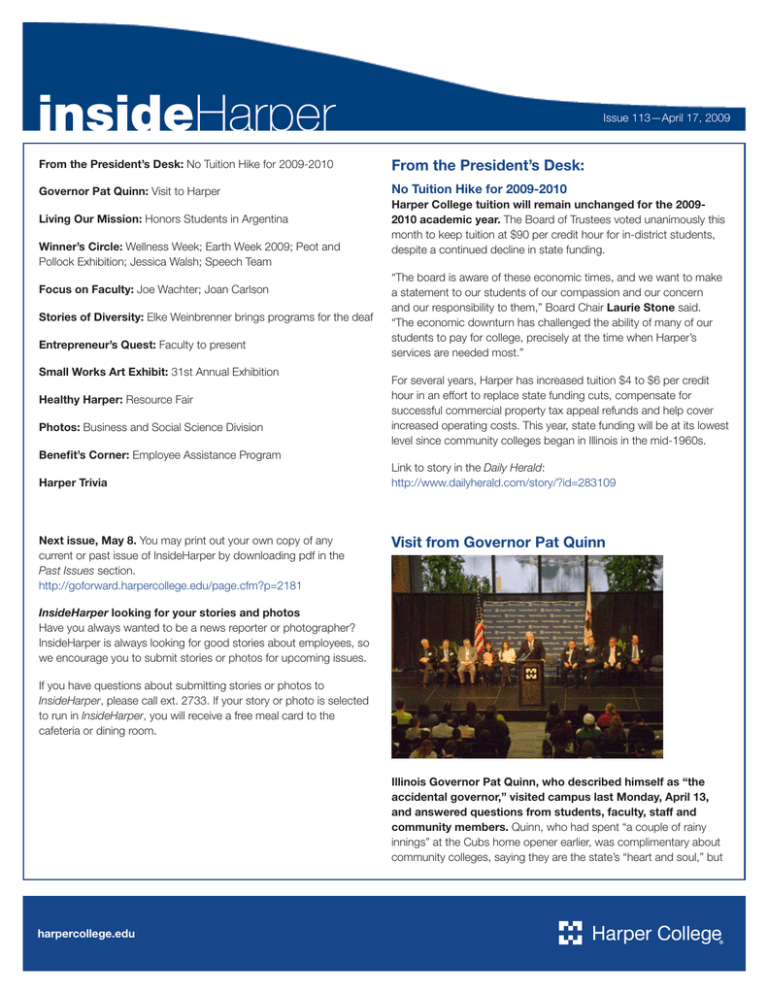
insideHarper Issue 113—April 17, 2009 From the President’s Desk: No Tuition Hike for 2009-2010 From the President’s Desk: Governor Pat Quinn: Visit to Harper No Tuition Hike for 2009-2010 Living Our Mission: Honors Students in Argentina Winner’s Circle: Wellness Week; Earth Week 2009; Peot and Pollock Exhibition; Jessica Walsh; Speech Team Focus on Faculty: Joe Wachter; Joan Carlson Stories of Diversity: Elke Weinbrenner brings programs for the deaf Entrepreneur’s Quest: Faculty to present Small Works Art Exhibit: 31st Annual Exhibition Healthy Harper: Resource Fair Photos: Business and Social Science Division Benefit’s Corner: Employee Assistance Program Harper Trivia Next issue, May 8. You may print out your own copy of any current or past issue of InsideHarper by downloading pdf in the Past Issues section. http://goforward.harpercollege.edu/page.cfm?p=2181 Harper College tuition will remain unchanged for the 20092010 academic year. The Board of Trustees voted unanimously this month to keep tuition at $90 per credit hour for in-district students, despite a continued decline in state funding. “The board is aware of these economic times, and we want to make a statement to our students of our compassion and our concern and our responsibility to them,” Board Chair Laurie Stone said. “The economic downturn has challenged the ability of many of our students to pay for college, precisely at the time when Harper’s services are needed most.” For several years, Harper has increased tuition $4 to $6 per credit hour in an effort to replace state funding cuts, compensate for successful commercial property tax appeal refunds and help cover increased operating costs. This year, state funding will be at its lowest level since community colleges began in Illinois in the mid-1960s. Link to story in the Daily Herald: http://www.dailyherald.com/story/?id=283109 Visit from Governor Pat Quinn InsideHarper looking for your stories and photos Have you always wanted to be a news reporter or photographer? InsideHarper is always looking for good stories about employees, so we encourage you to submit stories or photos for upcoming issues. If you have questions about submitting stories or photos to InsideHarper, please call ext. 2733. If your story or photo is selected to run in InsideHarper, you will receive a free meal card to the cafeteria or dining room. Illinois Governor Pat Quinn, who described himself as “the accidental governor,” visited campus last Monday, April 13, and answered questions from students, faculty, staff and community members. Quinn, who had spent “a couple of rainy innings” at the Cubs home opener earlier, was complimentary about community colleges, saying they are the state’s “heart and soul,” but harpercollege.edu insideHarper Issue 113—April 17, 2009 would not come out to endorse Harper’s proposal to offer four-year bachelor degrees. According to the article in the Daily Herald, for which there is a link below, “Quinn said his reservations stem from possible amendments to the bill and that he also wanted to see how traditional four-year schools would react to the potential competition.” http://www.dailyherald.com/story/?id=286331 Living Our Mission: Promoting personal growth with Honors Students in Argentina Seven students and Veronica Mormino, instructor, Geography, Business and Social Science, recently returned from a week in Argentina where the College’s mission of “promoting personal growth” ruled the adventure. The trip was over Harper’s spring break, and most of the students had never traveled outside the United States. Before leaving, the students met regularly on and off campus where Veronica told them about the country in which she was born. “I wanted to make sure they were super-prepared,” says Veronica, who was raised in Buenos Aires. “I e-mailed them constantly and told them what to bring and what to wear.” harpercollege.edu The Argentina trip is part of the vision for Harper’s Honors Program, to sponsor a semi-annual, study-abroad venture for students. The first such trip was to Japan two years ago. The group touched down in Buenos Aires where it was supposed to be fall-like weather, but turned out to be 90 degrees during the day. They stayed in a neighborhood called Recoleta, an area close to Plaza San Martin filled with restaurants and art galleries. The group visited another “barrio” or quarter known for its traditional atmosphere with artists and tango dancers where they were able to take tango lessons with a professional team of instructors. insideHarper Issue 113—April 17, 2009 “My favorite part, and I think most important, was learning about the Argentine culture. We are kind of closed off to some aspects of our cultures when we live in the United States and I think having the opportunity to go abroad with a group of honors students really added to my experience of learning about the Argentine culture.” Another student’s reaction: “Of course, great friendship wasn’t all we got out of the trip. Honestly, I think we left just as attached to Argentina as we were to each other. When you’re walking around Buenos Aires and meeting all these new people and learning about how they live and their history it’s hard not to find yourself getting completely absorbed in it all.” Another day was spent on the Argentine Pampas on a ranch with gauchos, which are Argentina’s version of cowboys. The students rode horses and attended a concert of traditional gaucho music and a barbecue. The trip also included learning how to shop using Spanish in a Buenos Aires supermarket, and sampling regional food from other areas of Argentina. The students will write a paper about their trip and experiences to earn two credits of Humanities 115. “We have to be very proud of these students,” says Veronica. “They were very friendly, respectful of another culture, and open to new experiences.” “We started out as a group of students who didn’t really know each other or feel comfortable with each other and now we are best friends pretty much,” said one student. “We still hang out and talk all the time, and I think this was a great experience for all of us.” harpercollege.edu “All of the sudden you start to look at the people on the street and wonder about their lives and their dreams and all of that and you’re suddenly aware of how huge the world is outside your own life, and how many different stories, histories, and perspectives there really are. Once you’re able to see that it’s hard to go back to your own life, and I think because of that and the connections we made we all had a really hard time leaving Argentina behind.” “In the end I think we left Argentina with broadened perspectives, great friends, a new fondness for a great city and people, and a bunch of wonderful experiences and stories to share at home.” insideHarper Winner’s Circle: Employees among presenters for Wellness Week Employees who are presenting for the College’s annual Wellness Week, which is Tuesday, April 21 through Thursday, April 23 are: Claudia Peyton, Music, The Alexander Technique for Every Body, 1:15 p.m. Tuesday, April 21, Room A243; and Introduction to the Alexander Technique (Hands-on-class) 12:15 p.m., Room M249, Thursday, April 23; Julie Atkins Waites, Health and Psychological Services, Loving Someone With a Mental Illness, 3 p.m., Room A243, Tuesday, April 21; and Breaking Up is Hard to Do, 3 p.m., Room A242, Wednesday, April 22; Steve Liggio, Harper Police, Safety in Public, 7 p.m., Room A242, Wednesday, April 22; Tom Thompson, Access and Disability Services; Anne Abasolo, and Larry Lasko, both of Student Development, The Happiness Advantage, 8:30 a.m., Room A242, Thursday, April 23. For more information about Wellness Week, call Health and Psychological Services at ext. 6268, or go to harpercollege.edu. Two Faculty present: Earth Week 2009 Two Harper faculty made presentations for Environment Club’s annual Earth Week 2009. Joshua Sunderbruch, associate professor, Liberal Arts, talked about why government protection of the environment makes sense. Also, Joe Wachter, full-time faculty in Chemistry, did a presentation about whether or not hybrid cars are really better for the environment given high environmental costs of manufacturing. Joe also discussed how car technology is changing and becoming more environmentally friendly. See story under Focus on Faculty for more details. Jason Peot and Perry Pollock Exhibit New Works April 27 through June 14 Jason Peot, assistant professor, and Perry Pollock, associate professor, both art faculty, Liberal Arts, will exhibit their work in Absence Presence, Monday, April 27 through Sunday, June 14 at The Architrouve, 1433 W. Chicago Avenue, Chicago. There will be an opening reception at 6 p. m. Friday, May l. harpercollege.edu Issue 113—April 17, 2009 “The work of Jason Peot and Perry Pollock intersect at a firm belief in the quiet power of abstract form,” says The Architrouve’s press release about the show. Jason, who will exhibit sculptural objects, uses materials such as aluminum, acrylic and wood, “which are left exposed and pristine as in much of today’s architecture.” For more information, go to jasonpeot.com. Perry’s drawings and objects are small-scale pieces, “which sometimes contain moveable parts, are treated to appear used or worn. Jason’s minimalist objects are designed independent of their surroundings. Interrelationships between surface, form and movement occur within rather than outside of his works.” For more information, go to perrypollock.com. For more information about the exhibit, go to http://goforward. harpercollege.edu/admin.cfm?tab=1 Jessica Walsh reads from her poetry collection Jessica Walsh, assistant professor, Liberal Arts, will read from her debut poetry collection Knocked Around, at 12 p.m. Monday, April 27 in Room D233, Building D. Described as a “stripped down series of poems exploring the connections that keep us here and the illusions that keep us apart,” Knocked Around was published as a chapbooks, which are short books of poetry “intended to get a poet’s work out here,” says Jessica, who has been teaching at Harper since 2002. “I’m now an assistant professor; my courses include composition and British literature,” says Jessica. “I started writing poetry in my teens and published several poems throughout high school and college. A lot of my early work was heavily influenced by nature, since I grew up in a small town on Lake Michigan where water and woods were the two entertainment options.” “Attending graduate school at the University of Iowa, I focused on literary criticism for several years,” she says. “I began writing more poetry once I settled in at Harper, but my most productive period has been the last two years, since the birth of my daughter Stella,” says Jessica. “Poetry has provided a meditative space for me, and it has pushed me outside of my identity as teacher/parent/spouse. In addition to writing, I spend a lot of time exploring the world with Stella, running, and reading.” insideHarper 2009 Harper College Speech & Debate Team: 6th in the Nation and Two National Champions The 2009 Harper College Speech Team traveled to Portland, Oregon (April 6-11, 2009) to compete at the Phi Rho Pi national community college speech and debate tournament. This year’s squad finished sixth overall. Sixty-seven community colleges competed at this year’s nationals. The team was eighth in 2008. The Harper squad won gold in three of the 13 speaking events boasting national champions in Prose Reading and Dramatic Interpretation. Issue 112—March 27, 2009 Focus on Faculty: Joe Wachter, full-time faculty in Chemistry For Harper’s recent Environmental Week, Joe Wachter, fulltime faculty in Chemistry, presented on the different types of “greener” technologies that have been proposed for transportation, like hydrogen fuel cells, ethanol fuels, and electric technologies (like solar cells and batteries). “I teach chemistry, so I talked a bit about the technologies’ underlying chemistry (without getting too technical),” says Joe. “All of these technologies have fervent supporters, yet they all require some significant advances in science to really be the solution to our problems. I wanted to illuminate the science behind the hype and paint a more realistic picture of the current state of things, good and bad,” he says. Joe says he first encountered this science as an undergraduate at the University of Michigan-Ann Arbor. “I did undergraduate chemistry research in Professor Omar Yaghi’s lab and was involved in some of the first ground-breaking research on gas storage in metalorganic frameworks, which are now being marketed commercially for hydrogen and methane storage, though they too have their drawbacks.” Top: Brooke Farrell, Sarah Goldenberg, Julie Swenson, Jamie Gutwein and Annie Sauter Bottom: Linda Hari, Ryan Clue, Neal Heatherly, Phil Kaiser and Tom Tracey Jeff Przybylo, associate professor, Margaret Bilos, instructor, and Josh Sunderbruch, associate professor, all of Liberal Arts are the coaches of the Speech Team. “The coaching staff is not only proud of the team’s competitive accomplishments, but also of their development as strong communicators and leaders,” says Jeff. “We are also very proud and thankful for all of the support from the College, and would additionally like to thank all of our alumni for helping and supporting our program in any and every way that they can, especially Jake Sadoff, Charlie Mulvey, Marcia Litrenta, Maham Khan, Linda Lang, River Ilknur Ozgur and Dave Nadolski.” harpercollege.edu “I went on to Michigan State University for my doctorate, working on solid-state semiconductors for data storage applications (not related to the energy stuff), and then started here at Harper in the fall. I moved to Palatine from Michigan in August 2008,” he says. Joe teaches organic chemistry and has started an undergraduate research project designing new polymer-based materials for hydrogen and methane storage. “I’m always looking for motivated Harper science students to join in on this research,” he says. Outside of science, Joe enjoys playing the clarinet in the Buffalo Grove Symphonic Band and performs as a classical guitarist for weddings and parties in the summers. “I also listen to music and I enjoy the Chicago Symphony, Lyric Opera, Northbrook Symphony, and various Harper ensembles live,” he says. His other hobbies include bicycling, hiking/backpacking, reading, grammar and wine. insideHarper Joan Carlson, associate professor, Health Careers Joan Carlson works with student nurses at Harper. She teaches Women’s Health, Obstetrics, Neonatal Nursing and Physical Assessment and says infusing information about domestic violence works perfectly for her coursework. Joan was recently granted a Domestic Violence Fellowship by the John and Rita Canning Women’s Program, and will attend a conference on the subject at Harper in May. “The students and I discuss reproductive health and problems in childbearing aged women. I also teach students how to do physical assessments, and so it’s an appropriate way to infuse domestic violence issues into the subject matter.” When she discusses domestic violence in class she says she frequently sees heads go down or sees hurt in someone’s eyes. Some students confide in her that that they are abused or know someone who is. “It’s a secret a lot of people have,” she says. “I teach them that domestic violence is the most common form of violence experienced by women worldwide with a reported incidence of one out of every six women.” The students are taught to ask questions during assessments such as: Do you feel safe at home?; Has anyone hit or hurt you?; Does your partner show unusual amounts of jealousy?; Has anyone verbally hurt you?; Has anyone forced you to have sex? “We talk about trauma to women of childbearing age and how violence often escalates during pregnancy,” says Joan, who has taught full time at Harper for the last 15 years. There is a pattern of abuse that has been researched that is referred to as the cycle of violence. The three-phase cyclic pattern has been documented as a period of increasing tension leading to abuse, which is then followed by a period of loving and kind behavior and pleas of forgiveness on the part of the batterer. A “honeymoon” phase continues until stress, tension and battering begins again. Over time, the tension and battering phases last longer, and the calm phase becomes shorter, until there is no honeymoon phase. (Walker,1984) “Nurses need to be their patients’ advocate because domestic violence has hit epidemic proportions,” she says. Joan works with our nursing students at St. Alexius Medical Center in Hoffman Estates and has also held discussions with her husband, a physician at Good Shepherd Hospital in Barrington who also asks questions and listens to his patients for signs and symptoms of domestic violence. Here is the Website for the National Domestic Violence Hot Line: http://www.ndvh.org/ harpercollege.edu Issue 113—April 17, 2009 Stories of Diversity: Elke Weinbrenner brings programs for the deaf to Harper Elke Weinbrenner, instructor in the American Sign Language Studies Program, took a class in solo performing at the Victory Gardens Theatre with Arlene Marlinowski, who is the child of deaf parents, or a CODA (Children of Deaf Adults). Arlene wrote a play called What Does the Sun Sound Like? based on her experience as a hearing child of deaf adults. The class was taught by Sandy Shinner (hearing), Victory Gardens Access Project Coordinator, Arlene, who is hearing, and Liz Tannebaum, who is deaf. They discussed overcoming language barriers, putting sign language to voice, and establishing connections with audiences. Arlene also performed excerpts from her play and readings from Aditi Brennan Kapil’s Pulitzer Prize nominated play Love Person, being premiered at Victory Gardens this spring. Elke’s class led her to talk to staff at the Victory Gardens about the possibility of bringing some type of panel discussion to Harper, focusing on the complications of making theatre more accessible to the deaf audience. She also talked to Laura Pulio Colbert, professor, and Kevin Long, instructor, both of Speech and Theatre, Liberal Arts and Joan Fiske, associate professor, American Sign Language Studies, and obtained their support for the program, evening obtaining CEU credits for Harper faculty through Faculty Development. “I hope this generates more thoughts and education on diversity issues on campus that involves language, culture, Deaf/hard of hearing issues and diverse communities,” she says. “I do hope to continue my connection with Victory Gardens for future events that can be provided for the Harper community.” Elke, who has been teaching American Sign Language for the last three years at Harper, is also collaborating with the International Studies Committee to present “A Road to Deaf mafia in Former Soviet Union” with Arkady Belozovsky, a professor of American Sign Language Studies at Brown University, at 6 p.m. Friday, May 8 in the J Building Theatre. For more information, contact Elke at eweinbre@harpercollege.edu. insideHarper Entrepreneur’s Quest 2009: Employees are Amongst Presenters for Daylong Seminar Tomorrow, Saturday, April 18, is the daylong seminar “filled with expert tips on everything from marketing and sales, to the best business plans and the latest technology” for those who want to launch a small business. Sponsored by the Illinois Small Business Development Center at Harper, “this workshop will offer strategies for getting started and thriving—not just surviving—despite economic challenges,” says Bonnie Richter, manager, Small Business Development. Harper employees among the presenters include: Mike Barzacchini, director, Marketing Services, 10 Ways to Become a World-Class Marketer; Maria Coons, interim vice president, Enrollment and Marketing Services and managing director, Harper College for Businesses, Negotiate to ‘Yes’; Bonnie Richter, director, Illinois Small Business Development Center, GROW IT! 10 Steps You Can Take to THRIVE in the Current Business Climate; Anna Ghiotti, specialist, Strategic Marketing, Crafting Your Unique Brand Identity; Katherine Sawyer, associate executive director, Foundation/ Major Gifts, 6 Strategies for Selling to Big(ger) Companies; and Erin Brooks, specialist, Media Relations, PR101: Getting Started with a Public Relations Program or Improving the One You Have. The cost of the seminar is $75, includes lunch and runs from 8 a.m. to 3:30 p.m. The first 50 people will receive a copy of “Everything I Know as a CEO I learned as a Waitress” by Carolyn Gable, who will give the keynote. For more information or to register, call 847.925.6100 or go to harpercollege.biz Small Works Art Exhibit The Harper Educational Foundation sponsored the 31st Annual Small Works National Art Exhibition, running now through Thursday, April 23. Held last evening, the Wine and Cheese Reception was sponsored by Dennis Weeks, dean, Liberal Arts. “I sponsor the small works reception because I think that the show provides national attention to Harper College and it provides an opportunity to showcase talent that might otherwise not be seen,” says Dennis. “The art collection at Harper is very fine and needs to be in the public’s eye.” harpercollege.edu Issue 113—April 17, 2009 insideHarper Healthy Harper: Resource Fair Health and Psychological Services sponsored a resource fair representing the collaborative efforts of service areas at Harper and an array of community agencies. The Resource Fair was one component of Harper’s Re/New You initiative, the fair and lecture following provided one stop access to information for community members affected by economic hardship. The Fair included: Hoffman Estates’ Department of Health and Human Services, Palatine Township’s Senior Center and Library, ACCESS Community Health Network, Northwest Community Hospital; Mobile Dental Clinic, the Kenneth Young Center, Alexian Brothers Center for Mental Health, Lutheran Social Services, the Palatine Opportunity Center, CEDA Northwest and Wellness Place. Representatives were on hand from Harper programs, including the office of scholarships and financial assistance, the Rita and John Canning Women’s Program and the fitness center. Wellness and stress management resources, including free blood pressure screenings, were available “As more of those suffering personally and financially have been welcomed into our campus community, we are learning of the depths of the social service needs of our new students,” says Kim Dell’Angela, associate dean, Wellness & Campus Activities, and director, Health and Psychological Services. “Staff at Harper will be called upon more often to respond to students whose abilities to go forward in their education is impeded by lack of access to basic resources such as food, shelter, and clothing,” she says. Download a list of community resources prepared by the team in HPS at http://goforward.harpercollege.edu/page.cfm?p=3599. The focus of the list is simple information that any staff member at Harper can provide to a student or community member who identifies a social service need. Photos: Business and Social Science Division has Bowling and Bocce Outing The Business and Social Science Division recently held a Bowling and Bocce Outing to Pinstripes, “a Bowling and Bocce Bistro” in South Barrington. Division staff and faculty brought family and friends to the event with 21 participants, including Marie Eibl, Michelé Robinson and husband Torvis, Judith Zaplatynsky, Dominique Svarc, Tim Skoning and guest, Bobby Summers, harpercollege.edu Issue 113—April 17, 2009 Dave Braunschweig, Cindy Miller and daughter Sami, Veronica Mormino, Barbara Koenig, Chris Buck, Sharon Page and husband Keith, Keri Bowman, Gail Karch and husband Ed, Kathy Schmitz and Enrique D’Amico. Last semester the division went to TopGolf, a golf practice and driving range, in Wood Dale. The group is planning another outing next semester, but Enrique says the location is “secret” and “under lock and key”. “There were many complimentary remarks about the outing,” says Enrique, who says the Pinstripes location was suggested by Chris Buck. “I never played Bocce before,” said one participant. “I loved it so much, I think I’ll start a Harper Bocce Club or League.” A slideshow with photos of the event can be viewed here: http://s601.photobucket.com/albums/tt100/ anthonymormino/Harper%20Bowling%20April%20 2009/?albumview=grid&track=share_email_album_view_click Benefit’s Corner: Employee Assistance Program The EAP (Employee Assistance Program) is a free benefit for Harper College employees and their family members. Workplace Solutions is the outside company that provides confidential referral and counseling services for you. You can call 800.327.5071 to speak to a counselor who can guide you to a variety of local resources about all sorts of workplace or home life issues, including legal and financial planning, childcare, adult daycare, dog walking services, marital problems, alcohol and drug related issues, stress, etc. The EAP counselor can help you clarify the nature of your concern and then help you evaluate what options are available to you. You can also access a lot of valuable information by logging onto www.wseap.com. Harper Trivia: March 27 question: How many animal species have been identified on campus by Randy Schietzelt, professor, Biology, Mathematics and Sciences, on his new Web site, The Animals of Harper College; A Key to Their Identification? Answer: 40. April 17 question: How many events were scheduled by the Environmental Club for Earth Week 2009? (Hint: See Winner’s Circle for a story.)

